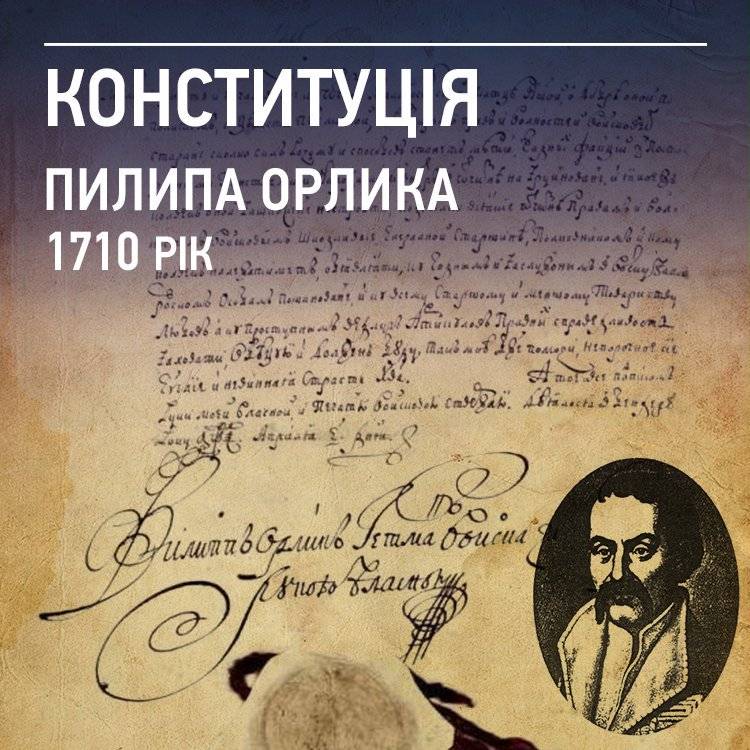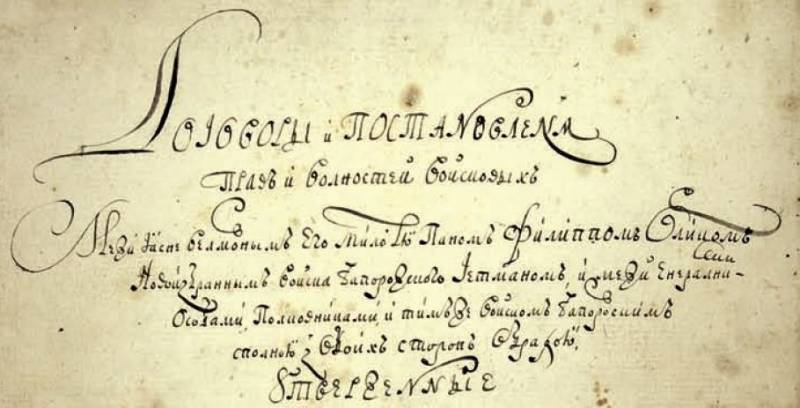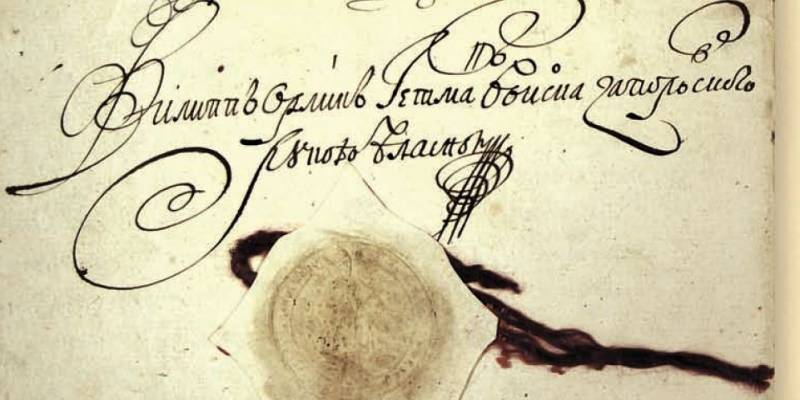Myths about the origin of Ukraine and the Ukrainians. Myth 7. The first constitution in the world Orlik

This nonsense was repeated by the president of Ukraine Yushchenko. argued that Orlik "the first in stories humanity in 1710 year wrote the first constitution. She is ninety years older than the Constitution of Poland and seventy years of the Constitution of America. It was the first Ukrainian Constitution, so we are Europeans ... we dictated democracy to Europe. "
So who is Orlik and what is this constitution? Hetman under this name in the history of the Cossacks did not exist. There was a general clerk Philip Orlik and a confidant under the traitor Mazepa, a noble Lithuanian nobleman of Czech origin. After the betrayal of Hetman Mazepa and his escape from the wagon train of the Swedish King Charles XII with several dozens of foremen and about four thousand Cossacks, they ended up in the Ottoman Empire in the city of Bender.
With the death of Mazepa, a part of the Cossack sergeant who fled with him in the presence of the Swedish king and the Turkish sultan chose Orlik as a false man. By the time, the Cossacks of Little Russia, according to the existing rules, had already elected on their own Rada in the city of Glukhov Hetman Skoropadsky, who was approved by Peter I.
When electing Orlik, he signed an agreement, the meaning of which was to ensure the rights and liberties of the Cossack officers, and Orlik swore that he would unconditionally fulfill them. The treaty approved the Swedish king Charles XII as a guarantor of its observance.
About the rights and liberties of the people of Little Russia there is not a word in it. The treaty limited the power of the falseman in favor of the general foremen-magnates. That is, even then they tried to consolidate the principle of oligarchic rule. The people in the contract are remembered only in the sense of collecting taxes from them and prohibiting abuses by subordinate officials to seize land, oppressions, extortions, bribes and illegal confiscations.
Despite the comic situation with the election of Orlik and the signing of his contract, modern Ukrainian myth-makers call this treaty a constitution, relying on an equally anecdotal translation of this document. The contract was drawn up in two languages, Old Russian and Latin, since it was signed by the "guarantor" Karl XII.
A copy of the contract in Old Russian was found only in 2008 in the Moscow archives, and the ukronauki myth-makers used a well-known copy in Latin, called “Rasta et Constitutes legum libertatumge Exercitus Zaporoviensis”. In the title there is the word "constitutions", and the false scientists translated it as "the constitution", and the treaty called "Covenants and the Constitution of the rights and liberties of the Zaporozhian Army."
Literally, the word “constitutions” from the Latin “constitutio” means “establishment, establishment, organization, resolution”. That is, if translated literally, the text will look like this: “Treaties and resolutions of the rights and liberties of the Zaporozhian Army”. There is no constitution here and close! The myth-makers in their translation laid a petty scam and translated in such a way that the name “constitution” remained in the title and could prove the authorship of the world's first constitution.
When the original copy of the contract in Old Russian was discovered, this primitive deception became apparent, which is clearly seen in the photocopies of the document. But this did not stop the myth-makers, they continue to talk about their own.
In addition to the word "constitution", the myth-makers also claim that the document is written in the Old Ukrainian language. If you look at the original language, it turns out that this is the Little Russia of the beginning of the 18 century, it is completely different from the clerical language of Peter's decrees and is much closer to the modern Russian language than to the modern Ukrainian. In addition, the document clearly shows that Orlik is not Pylyp, but has a completely Russian name, Philip.
The document itself or its photocopies try not to be shown, because not only is it not the Constitution at all, and it was not written in a move, there are no Ukrainians in it either. The document is written "in memory of the Zaporizhia and the Russian people in viisk". There is no “Ukrainian people” in the text of the treaty. Everywhere only "the people of Little Russia, Little Russia or Little Russia."

What do the articles of the treaty adopted in Turkish then Bender by a handful of renegades and the king of Sweden speak for without any permission of the actual Zaporozhye Cossacks and "the whole of Little Russia" who have never learned about the existence of such a document and such a hetman?
In the very first article, it was required, with the help of the Swedes, to liberate "our homeland, Little Russia" and ban Catholic and other services, Islam, "and most of all, Yiddish evil” (quote). Such a democracy was to be established with the help of a foreign army.
The second article defined the boundaries of Little Russia without western lands, retreating to Poland, and consolidated the Swedish protectorate over the Cossacks. Good constitution! More like a vassal oath.
The third article envisaged the conclusion of a military treaty with the Crimean Khanate, and a false man was obliged to ensure that the “headstrong and frivolous Cossacks” did not offend the Tatars.
Ukrainian myth-makers are trying to interpret this treaty as a document in which for the first time in the world a certain form of permanent parliamentarism was laid down and the principle of separation of powers into legislative, executive and judicial was fixed. On the grounds that it was envisaged the existence of a false judge (like the parliament) and the general judge.
There is nothing like this in the contract. The General Council, which is trying to ascribe the role of parliament, is not a parliament at all, but merely an advisory body under the hetman. This clearly follows from the 6-th clause of the contract, which describes its functions. She meets three times a year for only a few days in order to give advice to the hetman. Rada had no right to make laws. Moreover, its members did not even have the right to raise questions. Only discuss the initiatives of the hetman.
And the independent general judge is a total profanation, since he was one of the general officers, who decided who to appoint to this position, and in fact usurped the court.
Particular attention is paid to the guarantor - Charles XII. He is the patron, and benefactor, and so forth, and so forth. According to the text, they often appeal lowly to the Swedish king, extolling him as “Our Most High Protector of Ours” and recognize “His Royal Majesty the Swedish” for all time, that is, until now. And this is to Karl XII who was just completely defeated at Poltava. Only in the preamble the great Sweden is mentioned seven times! What kind of independence is there?
All this suggests that the contract of the false lieutenant Orlik with his foreman, approved by the Swedish king, is not a constitution, especially the first in the world. This is a myth based on a lie, and an attempt to invent a “great” story for yourself that never existed.


Information